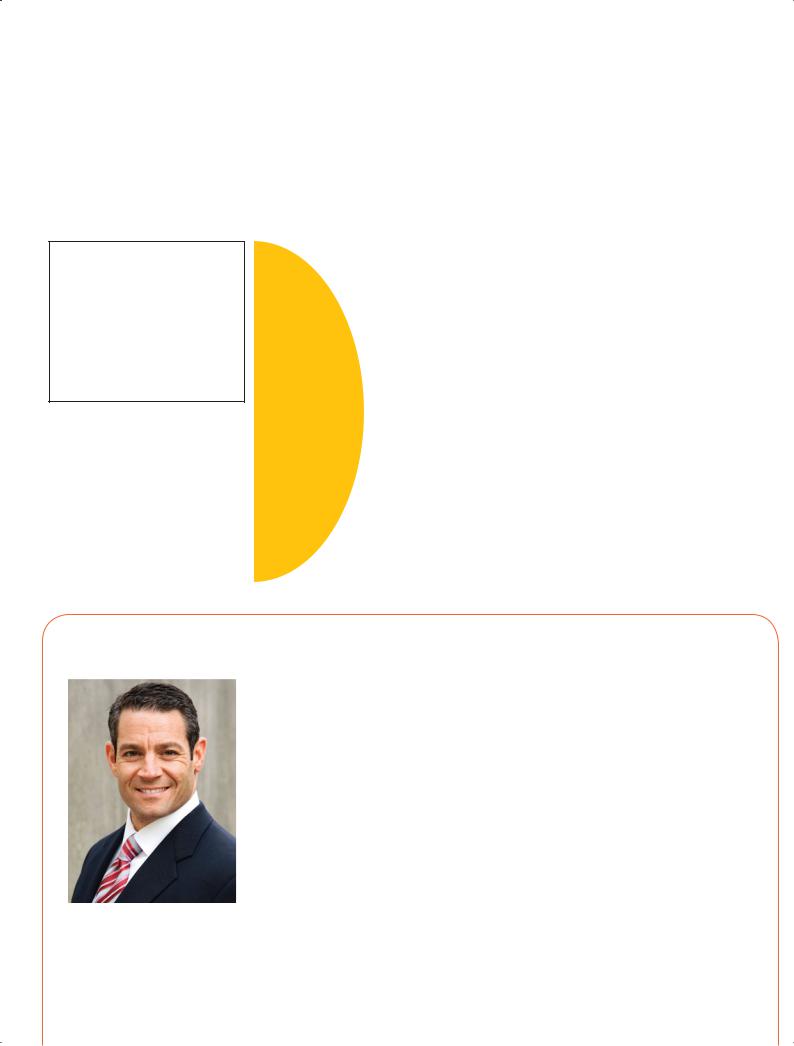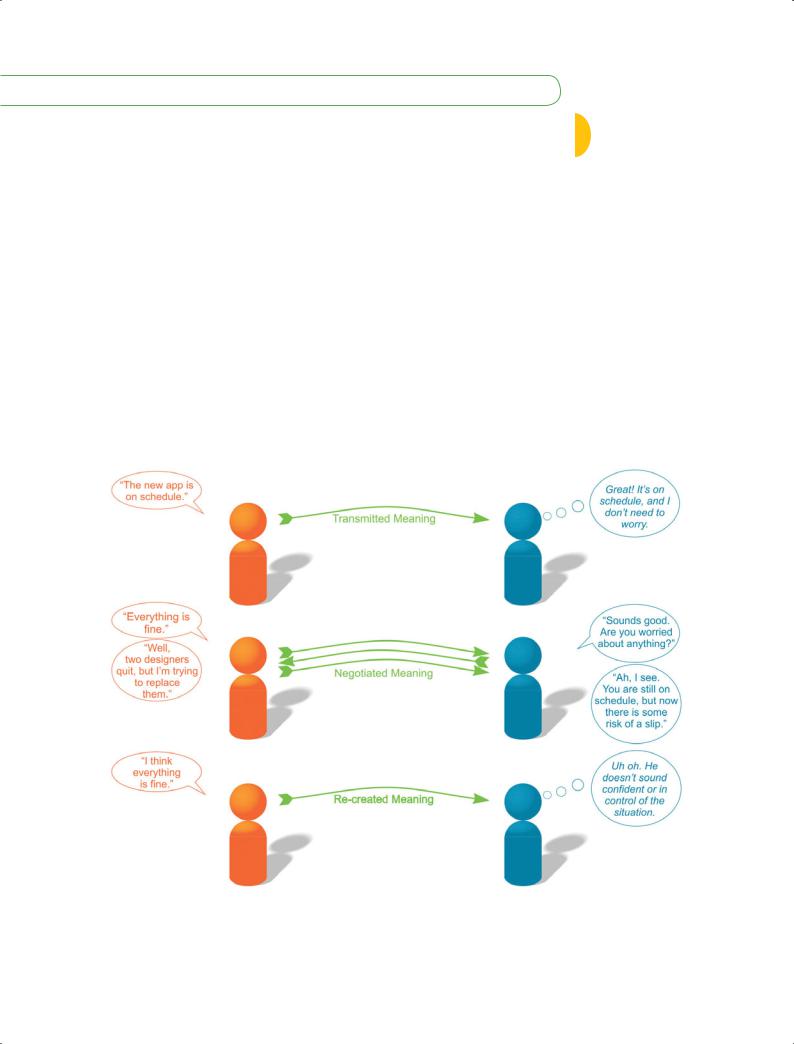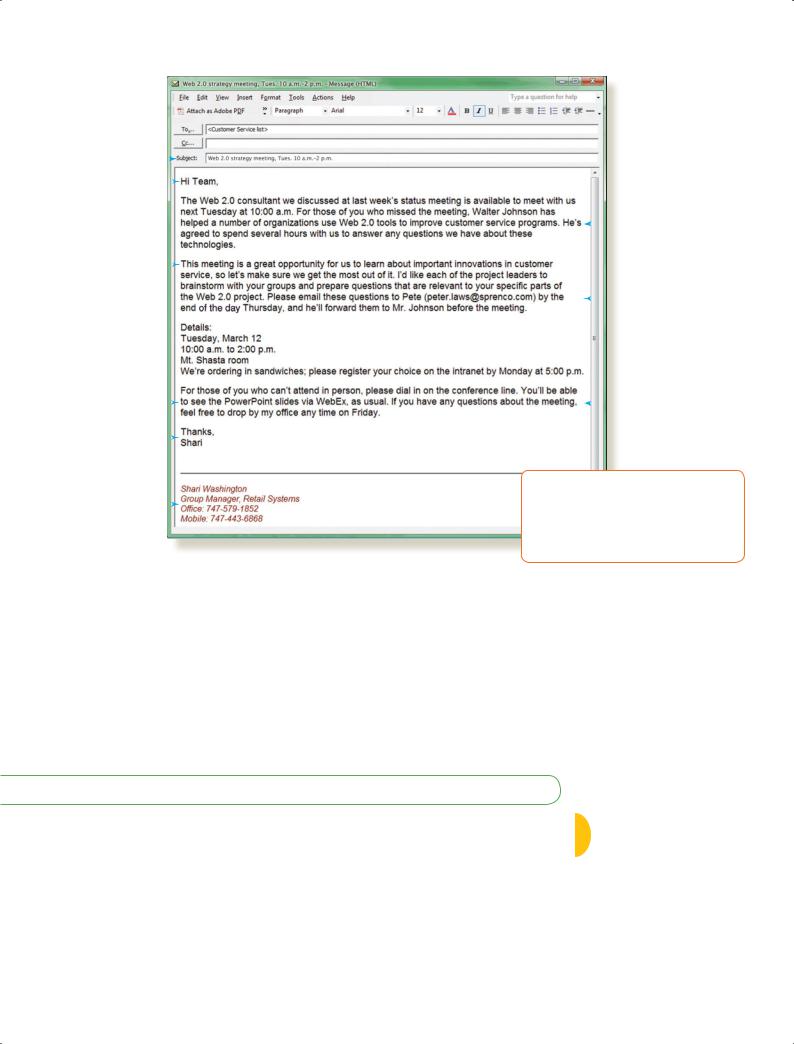
- •Understanding Why Communication Matters
- •Communicating as a Professional
- •Exploring the Communication Process
- •Committing to Ethical Communication
- •Communicating in a World of Diversity
- •Using Technology to Improve Business Communication
- •Chapter Review and Activities
- •Test Your Knowledge
- •Apply Your Knowledge
- •Practice Your Skills
- •Expand Your Skills
- •References
- •Understanding the Three-Step Writing Process
- •Analyzing the Situation
- •Gathering Information
- •Selecting the Right Medium
- •Organizing Your Message
- •Chapter Review and Activities
- •Test Your Knowledge
- •Apply Your Knowledge
- •Practice Your Skills
- •Expand Your Skills
- •References
- •Adapting to Your Audience: Building Strong Relationships
- •Adapting to Your Audience: Controlling Your Style and Tone
- •Composing Your Message: Choosing Powerful Words
- •Composing Your Message: Creating Effective Sentences
- •Composing Your Message: Crafting Coherent Paragraphs
- •Using Technology to Compose and Shape Your Messages
- •Chapter Review and Activities
- •Test Your Knowledge
- •Apply Your Knowledge
- •Practice Your Skills
- •Expand Your Skills
- •References
- •Revising Your Message: Evaluating the First Draft
- •Revising to Improve Readability
- •Editing for Clarity and Conciseness
- •Using Technology to Revise Your Message
- •Producing Your Message
- •Proofreading Your Message
- •Distributing Your Message
- •Chapter Review and Activities
- •Test Your Knowledge
- •Apply Your Knowledge
- •Practice Your Skills
- •Expand Your Skills
- •References
- •Electronic Media for Business Communication
- •Social Networks
- •Information and Media Sharing Sites
- •Instant Messaging and Text Messaging
- •Blogging
- •Podcasting
- •Chapter Review and Activities
- •Test Your Knowledge
- •Apply Your Knowledge
- •Practice Your Skills
- •Expand Your Skills
- •References
- •Strategy for Routine Requests
- •Common Examples of Routine Requests
- •Strategy for Routine Replies and Positive Messages
- •Common Examples of Routine Replies and Positive Messages
- •Chapter Review and Activities
- •Test Your Knowledge
- •Apply Your Knowledge
- •Practice Your Skills
- •Expand Your Skills
- •References
- •Using the Three-Step Writing Process for Negative Messages
- •Using the Direct Approach for Negative Messages
- •Using the Indirect Approach for Negative Messages
- •Sending Negative Messages on Routine Business Matters
- •Sending Negative Employment Messages
- •Sending Negative Organizational News
- •Responding to Negative Information in a Social Media Environment
- •Chapter Review and Activities
- •Test Your Knowledge
- •Apply Your Knowledge
- •Practice Your Skills
- •Expand Your Skills
- •References
- •Using the Three-Step Writing Process for Persuasive Messages
- •Developing Persuasive Business Messages
- •Common Examples of Persuasive Business Messages
- •Developing Marketing and Sales Messages
- •Chapter Review and Activities
- •Test Your Knowledge
- •Apply Your Knowledge
- •Practice Your Skills
- •Expand Your Skills
- •References
- •Applying the Three-Step Writing Process to Reports and Proposals
- •Supporting Your Messages with Reliable Information
- •Conducting Secondary Research
- •Conducting Primary Research
- •Planning Informational Reports
- •Planning Analytical Reports
- •Planning Proposals
- •Chapter Review and Activities
- •Test Your Knowledge
- •Apply Your Knowledge
- •Practice Your Skills
- •Expand Your Skills
- •References
- •Writing Reports and Proposals
- •Writing for Websites and Wikis
- •Illustrating Your Reports with Effective Visuals
- •Completing Reports and Proposals
- •Chapter Review and Activities
- •Test Your Knowledge
- •Apply Your Knowledge
- •Practice Your Skills
- •Expand Your Skills
- •References
- •Finding the Ideal Opportunity in Today’s Job Market
- •Planning Your Résumé
- •Writing Your Résumé
- •Completing Your Résumé
- •Chapter Review and Activities
- •Test Your Knowledge
- •Apply Your Knowledge
- •Practice Your Skills
- •Expand Your Skills
- •References
- •Submitting Your Résumé
- •Understanding the Interviewing Process
- •Preparing for a Job Interview
- •Interviewing for Success
- •Following Up After an Interview
- •Chapter Review and Activities
- •Test Your Knowledge
- •Apply Your Knowledge
- •Practice Your Skills
- •Expand Your Skills
- •References
- •Index

U N I T
Business Communication
Foundations
Maico Cappalunga/Shutterstock
CHAPTER 1 Understanding Business Communication
in Today’s Workplace
CHAPTER 2 Mastering Team Skills and Interpersonal
Communication

1 |
Understanding Business |
Communication in Today’s |
|
Workplace |
MyBCommLab®
 ImproveYour Grade!
ImproveYour Grade!
Over 10 million students improved their results using the Pearson MyLabs.
Visit mybcommlab.com for simulations, tutorials, and end-of- chapter problems.
LEARNING OBJECTIVES
After studying this chapter, you will be able to
1Define communication and explain the importance of effective business communication.
2 Explaincontext.what it means to communicate as a professional in a business
3Describe the communication process model and explain how social media are changing the nature of business communication.
4Define ethics, explain the difference between an ethical dilemma and an ethical lapse, and list six guidelines for making ethical communication choices.
5Explain how cultural diversity affects business communication and describe the steps you can take to communicate more effectively across cultural boundaries.
6 List four general guidelines for using communication technology effectively.
“Assertiveness adds power and conviction to a
Communication message and enables a leader’s voice to be heard.”
Matters . . .
If you want to make your voice heard in the business world, follow Scott Edinger’s advice: “You can clearly tell the difference between a message communicated with passion and vigor as a leader asserts his or her point of view and one that lacks the energy of conviction.”1 A healthy level of assertiveness is based on confidence, and confidence comes from having the knowledge and skills needed to do your job well. This course will help you develop the single most important skill you can have in any career: the ability to communicate effectively.
Scott Edinger
Being assertive will help you be heard on the job, but to be assertive you need the skills and knowledge that produce a healthy degree of confidence.
2

Chapter 1: Understanding Business Communication in Today’s Workplace |
3 |
Understanding Why Communication Matters
Communication is the process of transferring information and meaning between senders and receivers, using one or more written, oral, visual, or electronic media. The essence of communication is sharing—providing data, information, insights, and inspiration in an exchange that benefits both you and the people with whom you are communicating.2 As Figure 1.1 indicates, this sharing can happen in a variety of ways, including a simple and successful transfer of information, a negotiation in which the sender and receiver arrive at an agreed-upon meaning, and situations in which the receiver creates a different message than the one the sender intended to convey.
You will invest a lot of time and energy in this course to develop your communication skills, so it’s fair to ask whether it will be worthwhile. This section outlines the many ways in which good communication skills are critical for your career and for any company you join.
1 LEARNING OBJECTIVE
Define communication, and explain the importance of effective business communication.
Communication Is Important to Your Career
No matter what career path you pursue, communication skills will be essential to your success at every stage. You can have the greatest ideas in the world, but they’re no good to your company or your career if you can’t express them clearly and persuasively. Some jobs, such as sales and customer support, are primarily about communicating. In fields such as engineering or finance, you often need to share complex ideas with executives, customers, and colleagues, and your ability to connect with people outside your field can be as important as your technical expertise. If you have the entrepreneurial urge, you will need to communicate with a wide range of audiences, from investors, bankers, and government regulators to employees, customers, and business partners.
Ambition and great ideas aren’t enough; you need to be able to communicate with people in order to succeed in business.
Figure 1.1 Sharing Information
These three exchanges between a software project manager (left) and his boss (right) illustrate the variety of ways in which information is shared between senders and receivers. In the top exchange, the sender’s meaning is transmitted intact to the receiver, who accepts what the sender says at face value. In the middle exchange, the sender and receiver negotiate the meaning by discussing the situation. The negotiated meaning is that everything is fine so far, but the risk of a schedule slip is now higher than it was before. In the bottom exchange, the receiver has a negative emotional reaction to the word “think” and as a result creates her own meaning—that everything probably is not fine, in spite of what the sender says.

4Unit 1: Business Communication Foundations
Improving your communication skills could be the single most important thing you do for your career.
As you take on leadership and management roles, communication becomes even more important. The higher you rise in an organization, the less time you will spend using the technical skills of your particular profession and the more time you will spend communicating. Top executives spend most of their time communicating, and businesspeople who can’t communicate well don’t stand much chance of reaching the top.
In fact, improving your communication skills may be the single most important step you can take in your career. The world is full of good marketing strategists, good accountants, good engineers, and good attorneys—but it is not full of good communicators. View this as an opportunity to stand out from your competition in the job market.
Many employers express frustration at the poor communication skills of many employees—particularly recent college graduates who haven’t yet learned how to adapt their communication styles to a professional business environment. If you learn to write well, speak well, listen well, and recognize the appropriate way to communicate in any situation, you’ll gain a major advantage that will serve you throughout your career.3
This course teaches you how to send and receive information more effectively and helps you improve your communication skills through practice in an environment that provides honest, constructive criticism. You will discover how to collaborate in teams, listen effectively, master nonverbal communication, and participate in productive meetings. You’ll learn about communicating across cultural boundaries. You’ll learn a three-step process that will help you write effective business messages, and you’ll get specific tips for crafting a variety of business messages using a wide range of media, from social networks to blogs to online presentations. Develop these skills, and you’ll start your business career with a clear competitive advantage.
Effective communication delivers a variety of important benefits.
Effective messages are practical, factual, concise, clear, and persuasive.
Communication Is Important to Your Company
Aside from the personal benefits, communication should be important to you because it is important to your company. Effective communication helps businesses in numerous ways. It provides4
■Closer ties with important communities in the marketplace
■Opportunities to influence conversations, perceptions, and trends
■Increased productivity and faster problem solving
■Better financial results and higher return for investors
■Earlier warning of potential problems, from rising business costs to critical safety issues
■Stronger decision making based on timely, reliable information
■Clearer and more persuasive marketing messages
■Greater employee engagement with their work, leading to higher employee satisfaction and lower employee turnover
What Makes Business Communication Effective?
Effective communication strengthens the connections between a company and all of its stakeholders, those groups affected in some way by the company’s actions: customers, employees, shareholders, suppliers, neighbors, the community, the nation, and the world as a whole.5 To make your communication efforts as effective as possible, focus on making them practical, factual, concise, clear, and persuasive:
■Provide practical information. Give recipients useful information, whether it’s to help them perform a desired action or understand a new company policy.
■Give facts rather than vague impressions. Use concrete language, specific detail, and information that is clear, convincing, accurate, and ethical. Even when an opinion is called for, present compelling evidence to support your conclusion.
■Present information in a concise, efficient manner. Concise messages show respect for people’s time, and they increase the chances of a positive response.
■Clarify expectations and responsibilities. Craft messages to generate a specific response from a specific audience. When appropriate, clearly state what you expect from audience members or what you can do for them.

Chapter 1: Understanding Business Communication in Today’s Workplace |
5 |
An informative subject |
|
|
|
|
|
|
|
|
||||||
line helps people |
|
|
|
|
|
|
|
|
||||||
grasp key content |
|
|
|
|
|
|
|
|
||||||
immediately. |
|
|
|
|
|
|
|
|
|
|
|
|
|
|
|
|
|
|
|
|
|
|
|
|
|
|
|
|
|
The greeting is friendly |
|
|
|
|
|
|
|
|
|
|||||
|
|
|
|
|
|
|
|
|
||||||
without being too casual. |
|
|
|
|
|
|
|
|
||||||
|
|
|
|
|
|
|
|
|
|
|
|
|
|
The opening paragraph fills |
|
|
|
|
|
|
|
|
|
|
|
|
|
|
|
|
|
|
|
|
|
|
|
|
|
|
|
|
|
in missing information so |
|
|
|
|
|
|
|
|
|
|
|
|
|
|
that everyone can grasp the |
This paragraph |
|
|
|
|
|
|
|
|
|
|
|
|
importance of the message. |
|
|
|
|
|
|
|
|
|
|
|
|
||||
emphasizes the |
|
|
|
|
|
|
|
|
||||||
importance of the |
|
|
|
|
|
|
|
|
||||||
meeting. |
|
|
|
|
|
|
|
The request provides |
||||||
|
|
|
|
|
|
|
||||||||
|
|
|
|
|
|
|
|
|
|
|
|
|
|
enough information to |
|
|
|
|
|
|
|
|
|
|
|
|
|
|
enable readers to respond. |
The writer offers |
|
|
|
|
|
|
|
|
||||||
everyone a chance |
|
|
|
|
|
|
|
|
||||||
to participate, without |
|
|
|
|
|
|
|
|
||||||
making anyone feel |
|
|
|
|
|
|
|
|
||||||
guilty about not being |
|
|
|
|
|
|
|
|
||||||
able to attend in person. |
|
|
|
|
|
|
|
The closing paragraph |
||||||
(WebEx is an online |
|
|
|
|
|
|
|
|
|
invites questions ahead of |
||||
|
|
|
|
|
|
|
|
|
|
|||||
meeting system.) |
|
|
|
|
|
|
|
time so that they don’t |
||||||
|
|
|
|
|
|
|
|
|
|
|
|
|
|
derail the meeting. |
Like the greeting, the |
|
|
|
|
|
|
|
|
|
|||||
|
|
|
|
|
|
|
|
|
||||||
close has a warm and |
|
|
|
|
|
|
|
|
||||||
personal tone, without |
|
|
|
|
|
|
|
|
||||||
being too casual. |
|
|
|
|
MyBComm |
Lab Apply Figure 1.2’s |
||||||||
The email signature |
|
|
|
|
||||||||||
|
|
|
|
key concepts. |
Go to mybcommlab |
|||||||||
provides additional |
|
|
|
|
|
|||||||||
|
|
|
|
|
||||||||||
information and |
|
|
|
|
.com and follow |
this path: Course |
||||||||
alternative contact options. |
|
|
|
|
Content Chapter 1 DOCUMENT |
|||||||||
|
|
|
|
|
|
|
|
|
|
|
||||
|
|
|
|
|
|
|
|
|
|
|
MAKEOVERS |
|
||
Figure 1.2 Professional Communication
Notice how this message is more formal and “professional” sounding than the messages you typically send to your friends and family. Except for short messages between close colleagues and team members, most employers will expect you to communicate in a style that is more formal than the style you use for personal communication.
Source: Used with permission from Microsoft.
■Offer compelling, persuasive arguments and recommendations. Show your readers precisely how they will benefit by responding the way you want them to respond to your message.
Keep these five characteristics in mind as you review Figure 1.2.
Communicating as a Professional
You’ve been communicating your entire life, of course, but if you don’t have a lot of work experience yet, meeting the expectations of a professional environment might require some adjustment. A good place to start is to consider what it means to be a professional. Professionalism is the quality of performing at a high level and conducting oneself with purpose and pride. It means doing more than putting in the hours and collecting a paycheck; true professionals go beyond minimum expectations and commit to making meaningful contributions. Professionalism can be broken down into six distinct traits: striving to excel, being dependable and accountable, being a team player, demonstrating a sense of etiquette, making ethical decisions, and maintaining a positive outlook (see Table 1.1 on the next page).
A key message from Table 1.1 is how much these elements of professionalism depend on effective communication. For example, to be a team player, you have to be able to collaborate, resolve conflicts, and interact with a wide variety of personalities. Without strong
2 LEARNING OBJECTIVE
Explain what it means to communicate as a professional in a business context.
Communication is an essential part of being a successful professional.

6Unit 1: Business Communication Foundations
TABLE 1.1 Elements of Professionalism
Trait |
What It Means |
|
|
Be the best |
■ Pros strive to excel, to be the best they can be at everything they do. |
|
■ Excelling at every level is how pros build a great career. |
|
|
Be dependable |
■ Pros keep their promises and meet their commitments. |
|
■ Pros learn from their mistakes and take responsibility for their errors. |
|
|
Be a team player |
■ Pros know how to contribute to a larger cause. |
|
■ Team players make others around them better. |
|
|
Be respectful |
■ Pros know that good business etiquette is a sign of respect for those around them. |
|
■ Respecting others is not only good etiquette, it’s good for one’s career. |
|
|
Be ethical |
■ Responsible professionals strive to avoid ethical lapses. |
|
■ Pros weigh their options carefully when facing ethical dilemmas. |
|
|
Be positive |
■ Successful people believe in what they’re doing and in themselves. |
|
■ Pros don’t complain about problems; they find them and fix them. |
Employers expect you to have a broad set of communication skills, and you can practice all of these skills in this course.
communication skills, you won’t be able to perform to your potential—and others won’t recognize you as the professional you’d like to be.
This section offers a brief look at the skills that employerswill expect you to have, the nature of communication in an organizational environment, and the importance of adopting an audience-centered approach.
Understanding What Employers
Expect from You
Given the importance of communication in business, employers expect you to be competent at a wide range of communication tasks:6
■Organizing ideas and information logically and completely
■Expressing yourself coherently and persuasively in a variety of media
■Building persuasive arguments to gain acceptance for important ideas
■Evaluating data and information critically to know what you can and cannot trust
■Actively listening to others
■Communicating effectively with people from diverse backgrounds and experiences
■Using communication technologies effectively and efficiently
REAL-TIME UPDATES
Learn More by Reading This Article
Will your social media habits kill your career?
Follow these tips to make sure your social media habits don’t keep you from getting a job or derail your career after it has begun. Go to http://real-timeupdates.com/bce6 and click on Learn More. If you are using MyBCommLab, you can access Real-Time Updates within each chapter or under Student Study Tools.
■Following accepted standards of grammar, spelling, and other aspects of high-quality writing and speaking
■Adapting your messages and communication styles to specific audiences and situations
■Communicating in a civilized manner that reflects contemporary expectations of business etiquette
■Communicating ethically, even when choices aren’t crystal clear
■Respecting the confidentiality of private company information
■Following applicable laws and regulations
■ Managing your time wisely and using resources efficiently
